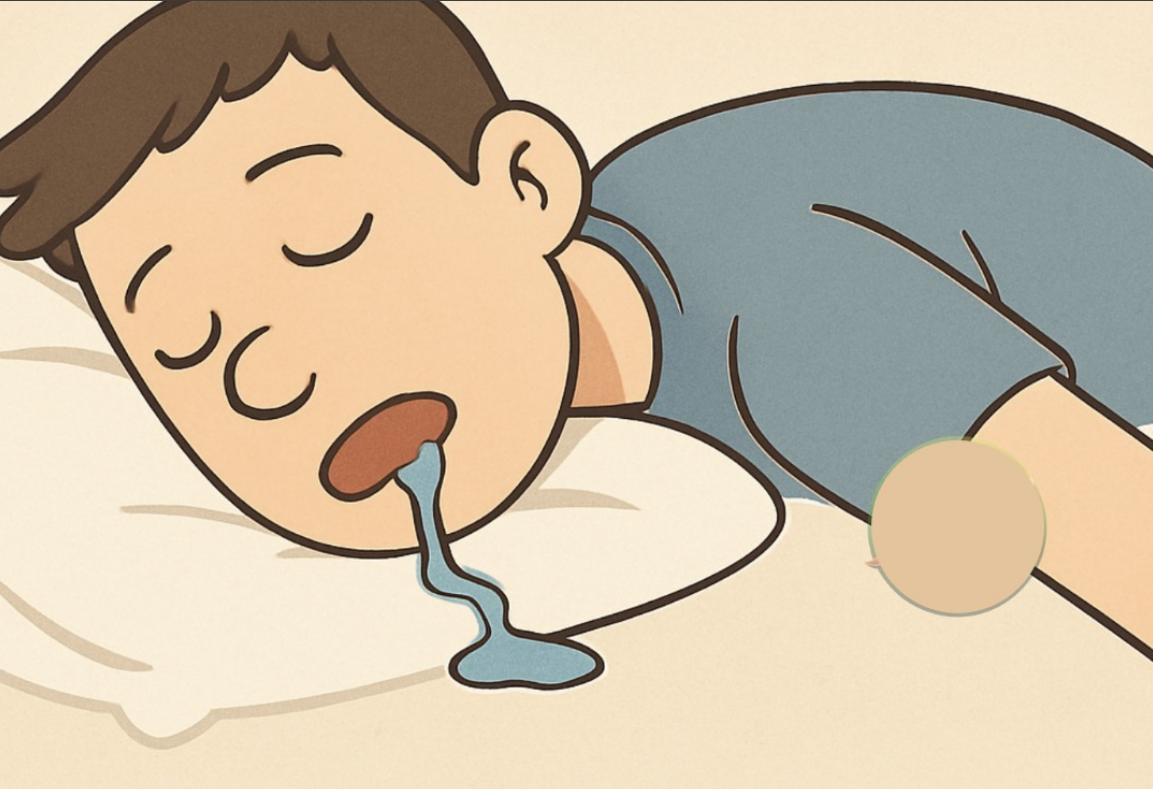It’s essential for:
Lubricating the mouth
Killing bacteria
Aiding digestion
Protecting teeth
Your salivary glands — including the parotid, submandibular, and sublingual glands — produce 1 to 1.5 liters of saliva per day.
This process is controlled by the autonomic nervous system, so you don’t have to think about it.
But certain factors can increase production or interfere with swallowing, leading to nighttime drooling.
🔍 When Should You Be Concerned?
Drooling while sleeping is normal in:
Babies and young children
People who sleep on their side or stomach
Those who are extremely tired
But if you’re an adult and you notice:
Soaking your pillow regularly
Sudden onset of drooling
Drooling with other symptoms (like slurred speech, facial weakness, or difficulty swallowing)
…it’s time to look deeper.
🚨 6 Health Conditions Linked to Excessive Nighttime Drooling
1. Oral Health Issues
Poor dental health can lead to excess drooling.
Gum disease (gingivitis)
Irritates gums, increases saliva
Tooth infections or abscesses
Pain and inflammation stimulate glands
Misaligned teeth or ill-fitting dentures
Makes it hard to keep mouth closed
✅ Fix: See a dentist. Treating the root cause often resolves the drooling.
2. Facial Paralysis (Bell’s Palsy or Stroke)
Damage to the facial nerve (cranial nerve VII) can weaken the muscles that control the mouth.
One side of the face may droop
You may drool from one side
Difficulty closing the eye on the same side
⚠️ Red flag: If drooling is new and paired with facial asymmetry, seek medical help immediately — it could be a stroke.
3. Gastroesophageal Reflux Disease (GERD)
Acid reflux can trigger the body’s natural defense: excess saliva.
Saliva acts as a natural antacid
When you lie down, saliva can pool and leak out
Often accompanied by heartburn, regurgitation, or sour taste in the morning
✅ Fix: Elevate your head while sleeping, avoid late meals, and manage reflux with diet or medication.
4. Parkinson’s Disease
One of the most common neurological causes of drooling.
Swallowing reflex slows down — saliva builds up
Reduced frequency of swallowing — even when awake
Increased saliva production due to nerve dysfunction
✅ Note: Drooling in Parkinson’s is not due to overproduction, but under-swallowing.
5. Stroke (Cerebral Thrombosis or Hemorrhage)
A stroke can damage brain areas that control facial muscles and swallowing.
Drooling may be one-sided
Comes with other symptoms:
Slurred speech
Weakness in arm or leg
Facial drooping
Confusion
🚨 Act FAST:
Face drooping
Arm weakness
Speech difficulty
Time to call emergency services
Every minute counts.
6. Arteriosclerosis (Hardening of the Arteries)
While not a direct cause, arteriosclerosis increases the risk of stroke and Parkinsonism — both of which can lead to drooling.
Plaque buildup in brain arteries reduces blood flow
Can cause mini-strokes (TIAs) that affect swallowing
✅ Prevention: Manage blood pressure, cholesterol, and blood sugar.
🛡️ Other Possible Causes (Not Diseases, But Worth Noting)
Sleep Apnea
Mouth breathing disrupts swallowing reflex
Medications
Some antipsychotics, seizure drugs, or Alzheimer’s meds increase saliva
Allergies or Sinus Issues
Force mouth breathing, leading to drooling
Sleeping Position
Side or stomach sleepers are more prone
🚩 When to See a Doctor
See a healthcare provider if:
Drooling is new, sudden, or worsening
It’s one-sided or accompanied by facial weakness
You have difficulty swallowing or speaking
You’re tired all the time (possible sleep apnea)
You have heartburn or acid reflux
👉 Don’t wait. Early diagnosis can prevent complications.
💬 Final Thoughts: Your Body Speaks — Are You Listening?
We ignore small signs.
We blame it on the pillow.
We say, “It’s just drool.”
But sometimes, the difference between “no big deal” and “early warning”…
Isn’t in the mess.
It’s in the pattern.
So if you’re drooling more than usual…
If it’s affecting your sleep or confidence…
If you’re tired all the time…
Don’t brush it off.
Pay attention.
Ask questions.
See a doctor if needed.
Because sometimes, the way you sleep — and what happens while you sleep — can tell you more about your health than you think.
And once you start listening?
You might just catch something before it becomes serious.
